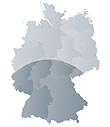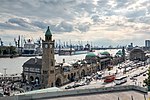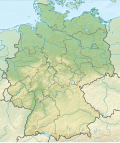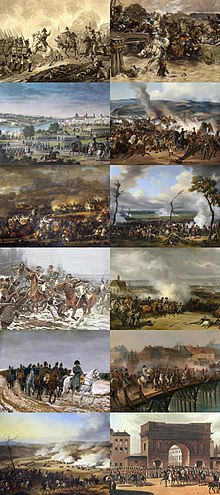Northern Germany (German: Norddeutschland, [ˈnɔʁtdɔɪ̯tʃlant] ) is a linguistic, geographic, socio-cultural and historic region in the northern part of...
22 KB (2,098 words) - 01:27, 21 October 2024
the northern parts of modern Germany since classical antiquity. A region named Germania was documented before AD 100. In 962, the Kingdom of Germany formed...
202 KB (16,464 words) - 21:10, 5 January 2025
Northern Low German (Standard High German: nördliches Niederdeutsch) is a variety of Low German in Germany, distinguished from Southern Low German. From...
6 KB (482 words) - 07:41, 8 August 2024
Low German is a West Germanic language spoken mainly in Northern Germany and the northeastern Netherlands. The dialect of Plautdietsch is also spoken in...
116 KB (8,411 words) - 19:55, 9 January 2025
Northern Low Saxon (in Standard High German: Nordniedersächsisch, also Nordniederdeutsch, lit. North(ern) Low Saxon/German; in Standard Dutch: Noord-Nedersaksisch)...
10 KB (899 words) - 11:37, 30 December 2024
the way for the Lesser German version of German unification in the form of a federal state in Northern Germany. The construction of such a state became...
32 KB (3,411 words) - 05:41, 10 December 2024
Southern Germany primarily contrasts with Northern Germany and defines the territories of modern Germany that did not form part of the North German Confederation...
12 KB (798 words) - 16:22, 9 December 2024
Great Northern War (1700–1721) a coalition led by the Tsardom of Russia successfully contested the supremacy of the Swedish Empire in Northern, Central...
72 KB (7,206 words) - 15:01, 8 January 2025
traditional German dialects, especially in Northern Germany. German Standard German Austrian Standard German Swiss Standard German In the German-speaking...
142 KB (14,337 words) - 05:24, 7 January 2025
traditional German dialects, especially the Low German of Northern Germany. The variation among German dialects ranges. In regions with dialects are being...
23 KB (2,712 words) - 21:29, 29 December 2024
written language. People in Northern Germany who spoke mainly Low Saxon dialects, which were very different from Standard German, learned it more or less...
41 KB (3,563 words) - 17:46, 9 January 2025
corresponding to the territories of modern Sweden, Norway, Denmark, northern Germany, Poland, the Netherlands and Belgium. The region entered the Mesolithic...
25 KB (2,545 words) - 00:53, 11 January 2025
Netherlands and had conquered Northern Germany. The Canadian forces went home following the German surrender, leaving Northern Germany to be occupied by the British...
59 KB (6,394 words) - 17:29, 30 December 2024
The Vicariate Apostolic of Northern Germany (Latin: Vicariatus Apostolicus Germaniae Septentrionalis), known for most of its existence as the Vicariate...
69 KB (3,036 words) - 02:08, 25 October 2024
Democratic Party of Germany (German: Sozialdemokratische Partei Deutschlands, [zoˈtsi̯aːldemoˌkʁaːtɪʃə paʁˌtaɪ ˈdɔʏtʃlants], SPD, German pronunciation: [ɛspeːˈdeː]...
136 KB (4,258 words) - 15:21, 31 December 2024
Hamburg (redirect from Hamburg, Germany)
elsewhere in Germany, Standard German is spoken in Hamburg, but as typical for northern Germany, the original language of Hamburg is Low German, usually referred...
156 KB (14,784 words) - 09:51, 9 January 2025
Germanic languages (redirect from German languages)
derived from Proto-Germanic, spoken in Iron Age Scandinavia, Iron Age Northern Germany and along the North Sea and Baltic coasts. The West Germanic languages...
94 KB (9,575 words) - 07:54, 3 January 2025
northeast. Between lie the forested uplands of central Germany and the low-lying lands of northern Germany (lowest point: Neuendorf-Sachsenbande at 3.54 metres...
53 KB (3,428 words) - 23:47, 6 January 2025
The Northern March or North March (German: Nordmark) was created out of the division of the vast Marca Geronis in 965. It initially comprised the northern...
12 KB (1,322 words) - 19:00, 7 January 2025
Germans (German: Deutsche, pronounced [ˈdɔʏtʃə] ) are the natives or inhabitants of Germany, or sometimes more broadly as a sociolinguistic group of those...
44 KB (4,841 words) - 14:09, 5 January 2025
The concept of Germany as a distinct region in Central Europe can be traced to Julius Caesar, who referred to the unconquered area east of the Rhine as...
362 KB (42,079 words) - 06:26, 5 January 2025
The term "Lesser Germany" (German: Kleindeutschland, pronounced [ˌklaɪ̯nˈdɔɪ̯t͡ʃlant] ) or "Lesser German solution" (German: Kleindeutsche Lösung) denoted...
9 KB (1,287 words) - 16:12, 20 August 2024
country. About half belongs to the Protestant Church in Germany (EKD) predominant in the northern regions, and the rest to several small Christian denominations...
104 KB (9,330 words) - 10:52, 6 January 2025
earliest evidence of Germanic culture dates to the Jastorf culture in Northern Germany and Denmark. Contact with Germanic tribes were described by various...
62 KB (6,122 words) - 16:30, 6 January 2025
[a] or even [æ] is a common realization of /a/ in northern German varieties influenced by Low German. /aː/ has been variously described as open central...
100 KB (10,351 words) - 19:14, 4 January 2025
Hanover (redirect from Hanover, Germany)
932 (2021) makes it the 13th-largest city in Germany as well as the fourth-largest in northern Germany after Berlin, Hamburg and Bremen. Hanover's urban...
98 KB (9,044 words) - 19:33, 31 December 2024
Slovakia as well). In Northern Europe, in Denmark more specifically, the traditional Danish cuisine had also been influenced by German cuisine in the past...
82 KB (8,622 words) - 06:01, 7 January 2025
Eastern Germany. It is different from Schwarzbier, which is a lager. While the beer market is weaker but more centralized in northern Germany, southern...
20 KB (2,279 words) - 19:47, 2 December 2024
War of the Sixth Coalition (redirect from German liberation wars)
Prussia 2 Germany 1 In the War of the Sixth Coalition (French: Guerre de la Sixième Coalition) (December 1812 – May 1814), sometimes known in Germany as the...
53 KB (6,287 words) - 11:33, 31 December 2024
High German consonant shift to a lesser degree than Upper German. It is spoken in the linguistic transition region separated from Northern Germany (Low...
5 KB (297 words) - 06:12, 21 October 2024






















